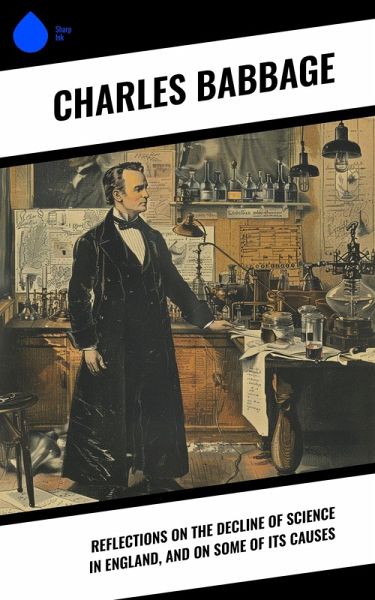
Reflections on the Decline of Science in England, and on Some of Its Causes (eBook, ePUB)
Sofort per Download lieferbar
2,13 €
inkl. MwSt.

PAYBACK Punkte
0 °P sammeln!
In "Reflections on the Decline of Science in England, and on Some of Its Causes," Charles Babbage delivers a critical analysis of the factors contributing to the stagnation of scientific progress in early 19th-century England. Renowned for his innovative work in computing, Babbage adopts a didactic tone, employing a blend of empirical observation and historical context. He meticulously dissects the interplay between societal attitudes, educational frameworks, and institutional inertia, demonstrating how these elements conspired to undermine the scientific rigor that once flourished in the nati...
In "Reflections on the Decline of Science in England, and on Some of Its Causes," Charles Babbage delivers a critical analysis of the factors contributing to the stagnation of scientific progress in early 19th-century England. Renowned for his innovative work in computing, Babbage adopts a didactic tone, employing a blend of empirical observation and historical context. He meticulously dissects the interplay between societal attitudes, educational frameworks, and institutional inertia, demonstrating how these elements conspired to undermine the scientific rigor that once flourished in the nation. Babbage's prose exemplifies the precision of rational thought, typical of the Enlightenment, while remaining accessible to a broader audience, making complex ideas digestible for contemporary readers. As a pioneer mathematician and inventor, Charles Babbage's own experiences undoubtedly shaped his perspective. He witnessed firsthand the creative potential of scientific inquiry during the Industrial Revolution, yet became increasingly disillusioned by the resistance to innovation and the lack of official support for scientific endeavors. His multifaceted career, encompassing roles in academia and public service, imbued him with a wealth of knowledge that informs his critiques and recommendations throughout the text. "Reflections on the Decline of Science in England" is essential reading for anyone interested in the history and evolution of scientific thought. Babbage's insights resonate beyond his era, offering a prescient warning about the perils of complacency in knowledge pursuits and urging contemporary scholars to safeguard the integrity and vitality of scientific inquiry.
Dieser Download kann aus rechtlichen Gründen nur mit Rechnungsadresse in A, B, BG, CY, CZ, D, DK, EW, E, FIN, F, GR, HR, H, IRL, I, LT, L, LR, M, NL, PL, P, R, S, SLO, SK ausgeliefert werden.













